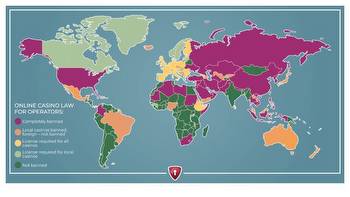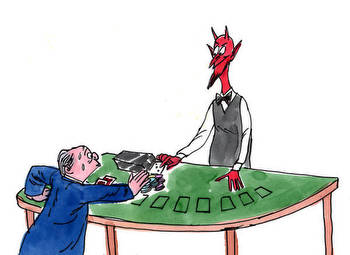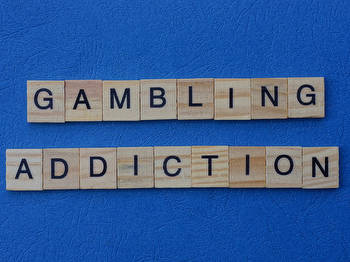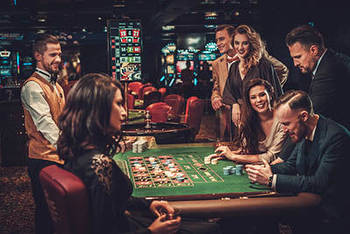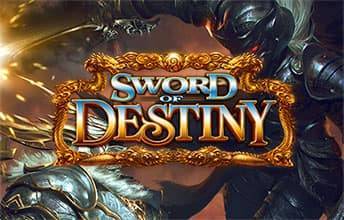The Trouble with Gambling

We just passed the biggest gambling event of the year in the Super Bowl and we’re about to enter the second biggest gambling event of the year in March Madness. As a more relevant topic than ever and as a growing practice for many sports fans around the world, Cale spent a segment of The Cale Clarke Show diving into the concept of gambling and his experience with it.
As the gambling world has evolved with the age of technology by introducing apps and digital sites for betting, so to have the bets themselves evolved. You can bet on the length of the National Anthem, the outcome of the coin toss, the number of penalties, the color of someone’s shoes, the length of the halftime show, and a million other things. It’s an attempt to get as many people involved in sports gambling as possible, whether they follow sports or not. And it’s working.
But that’s not immoral on its own. As a business, you want to attract as many customers as possible. That’s understandable. But when discussing the morality of something like gambling, you need to look at factors like the intrinsic nature of gambling, the methods of attraction, potentially predatory practices, and just what stakeholders in gambling companies are doing to assure the well-being of all users.
Cale actually worked in the gambling industry for a while in his early 20s when they introduced a casino to his town of Cole Harbor in Nova Scotia. Out of the hundreds of people wrapped around the block looking to apply for a job there, Cale was one of the select few to get hired. While he started humbly in the parking lot, he was soon bumped up to a position on the in-house marketing team.
He remembers being trained to begin a promotional campaign inside the casino itself and one of the superiors told him that he should not be surprised if he witnesses people refusing to leave the slot machines to eat or go to the bathroom. It’s so addicting that people post up there for hours. Throughout his time in the casino, Cale learned the tricks of the casino. He noticed that there were no windows and there were no clocks. They purposely wanted people to lose track of time and spend as much time as possible inside.
And, as everybody knows (or should know) the odds are always in the house’s favor. “To misquote The Hunger Games, the odds are [never] in your favor,” said Cale. There’s no such thing as a sure thing, and if you stick around betting for long enough, you’ll end up in the red. That’s why casinos owners want you in their establishment for as long as possible. But, as Cale pointed out, it’s a money-making venture. You should know the risk going into it and that’s why you’re required to be 21 to gamble.
When Cale first started his position at the casino, he saw gambling as just another form of entertainment. For instance, people pay to go to sporting events. They pay to go bowling or to a movie. People are similarly paying for this gambling experience (unless you win money). However, the more time Cale spent there, the more he realized that there’s nothing entertaining about losing your money. And, he said, the majority of people he noticed going to bet their hard-earned money were people who could not afford to do so.
The ironic part was that in the end, gambling has absolutely nothing to do with money. People don’t get addicted because they’re chasing a win or trying to keep a streak going. People get addicted because they’re obsessed with the feeling, the thrill. It’s an artificial trigger of dopamine that makes you feel good. Eventually, Cale began getting uncomfortable with his role in the casino and he turned to his spiritual director.
“Do you think gambling is wrong?” Cale asked Father Mike. “Well,” he said, “I think gambling and this whole industry plays on an inherent weakness of human beings, which is the temptation to fall for the love of money.” One of the most commonly misquoted passages of the Bible is in 1 Timothy. People often say that “money is the root of all evil” when the passage actually says, “For the love of money is the root of all evils, and some people in their desire for it have strayed from the faith and have pierced themselves with many pains.” (1 Timothy 6:10) Money is not the cause of problems, but an inordinate love for money is.
“Games of chance (card games, etc.) or wagers are not in themselves contrary to justice. They become morally unacceptable when they deprive someone of what is necessary to provide for his needs and those of others. The passion for gambling risks becoming an enslavement. Unfair wagers and cheating at games constitute grave matter, unless the damage inflicted is so slight that the one who suffers it cannot reasonably consider it significant.” (CCC, #2413)
Listen to the full segment below:
Tune in to The Cale Clarke Show weekdays at 5pm CT










